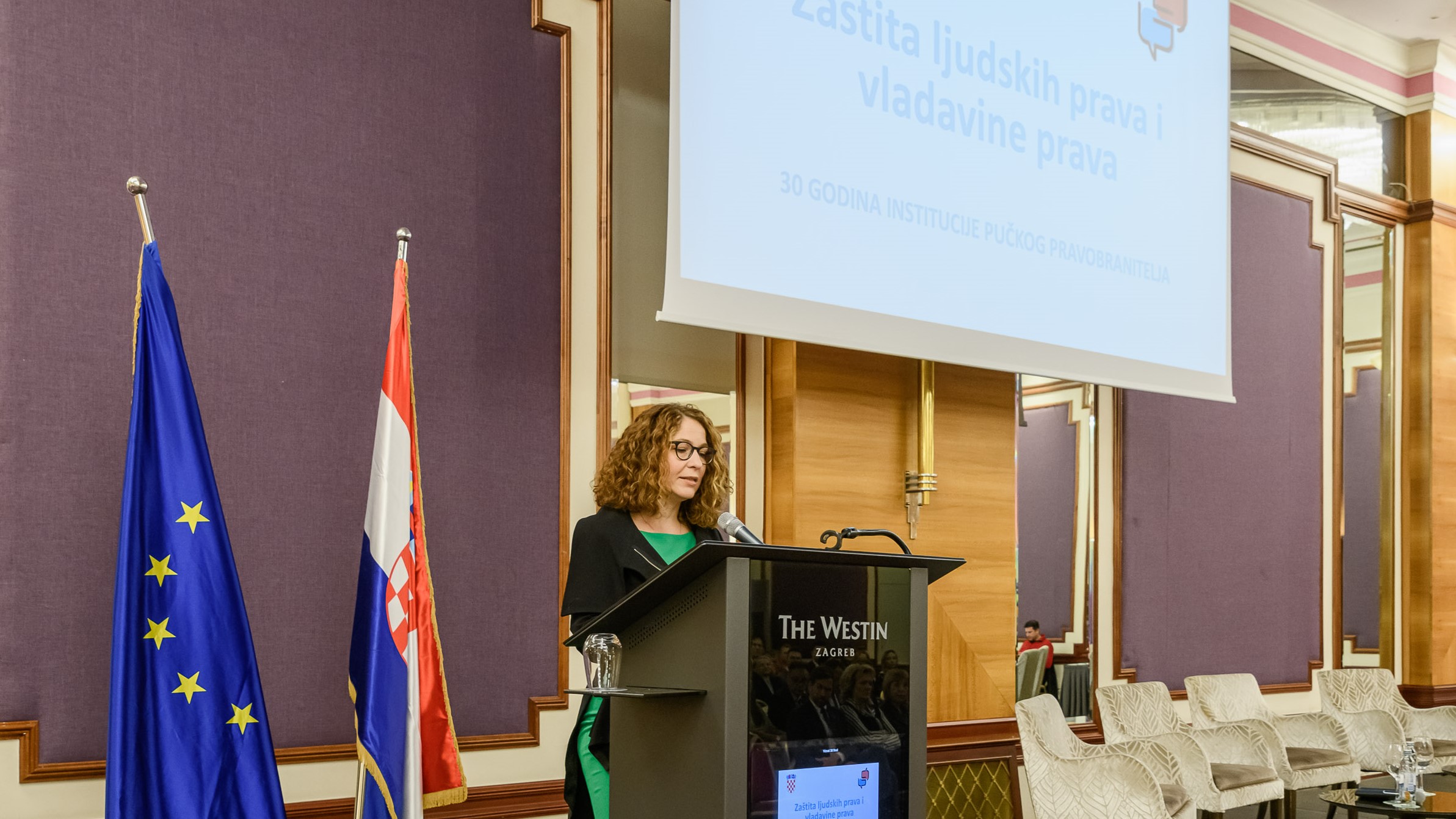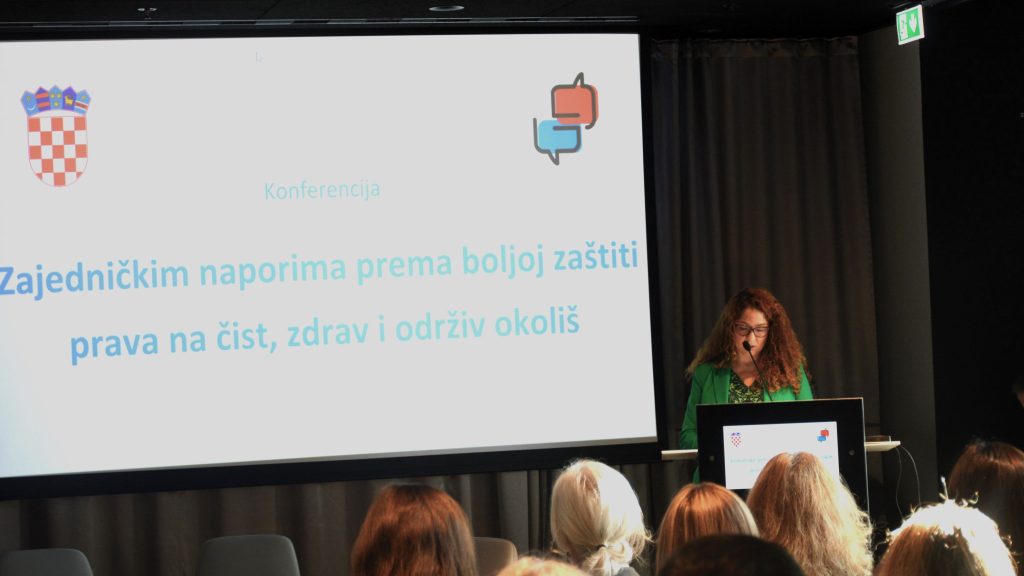Below is the speech delivered by Ombudswoman Tena Šimonović Einwalter at the opening of the conference “Protection of Human Rights and the Rule of Law”, marking 30 years since the establishment of the Office of the Ombudswoman.
“Dear Mr. Plenković, Prime Minister of the Republic of Croatia,
Dear Mr. Radin, Deputy Speaker and Envoy of the President of the Croatian Parliament,
Dear Judges of the Constitutional and Supreme Courts,
Dear Members of Parliament,
Dear Mr. Klarić, former Ombudsman,
Dear Ombudswomen Pirnat Dragičević, Ljubičić, and Slonjšak,
Esteemed representatives of state bodies, the diplomatic corps, civil society organizations, academia, religious communities, and the media,
Dear current and former Deputies and staff members of our institution,
Dear all,
I warmly greet you and thank you for joining us today as we reflect on a moment in the past—the entry into force of the first Ombudsman Act 30 years ago—while turning our focus to the present and the future. An anniversary is not only a time to look back but also an opportunity to evaluate where we are now and to envision the path ahead.
We are using this 30th anniversary as an opportunity to discuss human rights and the rule of law in Croatia, with a focus on people—their problems and lived experiences. It is important to speak about human rights not just as abstract values, but as concrete rights—drawing a clear line from personal experience and difficult realities to the realization of justice and rights in everyday life.
We gather today to honor the past; the first panel will focus on the present—on real problems and experiences—while the second panel turns toward the future, through contributions from experts across various fields.
Today’s program, and the fact that we are all here together, also illustrates another key role of this institution: to serve as a bridge—bringing together, collaborating, and communicating with public officials, citizens, institutional representatives, civil society organizations, the media, academia, and many others.
Allow me, then, to use this opportunity to speak about the institution of the Ombudsperson itself, as we celebrate 30 long and significant years of its work.
These past 30 years bear witness to the dedicated efforts and contributions of all previous ombudspersons—the late Branko Babac, Ante Klarić (who is with us today), the late Jurica Malčić, and Lora Vidović —
as well as all current and former deputies and staff members, to whom I express my deepest gratitude.
I also thank the citizens who, throughout all these years, have reached out to us with their complaints and concerns, convinced that human rights protection and the rule of law in Croatia must be strengthened.
Over the past 30 years, we have also been shaped by our cooperation with all of you.
So, where are we today?
Today, we are five institutions in one—an office with five distinct mandates, each of which, in many European countries, is carried out by a separate institution. The Office of the Ombudswoman is today:
- The Ombudsperson – handling complaints regarding illegality and irregularities (our first mandate, and still how many people perceive us);
- The National Human Rights Institution, accredited with the highest level of independence—“A status”;
- The Central Equality Body for Combating Discrimination in Croatia;
- The National Preventive Mechanism for the prevention of torture and other cruel, inhuman or degrading treatment or punishment;
- The Whistleblower Protection Body.
Our day-to-day work includes a wide range of activities:
- Handling individual cases—whether initiated by complaints or ex officio—where we issue recommendations, opinions, proposals, and warnings when we find human rights violations or potential discrimination, and we monitor their implementation;
- Preparing and submitting reports to the Croatian Parliament—not reports on our activities, but analytical assessments of the state of human rights and equality in Croatia, along with recommendations and special thematic reports;
- Providing opinions and proposals on laws, regulations, and strategic documents;
- Field visits—especially as part of our NPM mandate—to places of deprivation or restriction of liberty (e.g., prisons, penitentiaries, detention centers, psychiatric institutions, police stations), and regular visits to Roma settlements, homes for the elderly, areas affected by earthquakes, rural areas, and more;
- Organizing public events;
- Conducting research;
- Participating in court proceedings and monitoring the implementation of judgments of the European Court of Human Rights;
- Reporting to UN treaty bodies and participating in the Universal Periodic Review process within the UN Human Rights Council.
Everything I have mentioned about our history, mandates, working methods, and tools means that the number of fields and topics in which we are active is exceptionally broad. These include: the right to good governance, the impact of earthquakes and the pandemic on human rights, labor rights and discrimination at work, the rights of older persons, discrimination based on race, ethnicity, religion, or financial status (and other grounds from the Anti-Discrimination Act), the effects of poverty, the right to adequate housing, the rights of national minorities, veterans’ rights, issues related to the judiciary, freedom of expression, the right to peaceful assembly, the impact of digitalization and artificial intelligence, whistleblower protection, police conduct—and many others. In each of these areas, there are numerous specific issues that affect people and lead them to contact us.
We are five institutions in one, yet all of our mandates are connected by a common thread: the protection of human rights and the rule of law—and all must be carried out by an independent institution.
Independence is our greatest strength, the very foundation of institutions like ours, and central to all five of our mandates.
The more difficult, controversial, or politically sensitive a topic is, the more important independence becomes.
This is why the independence of independent institutions is one of the strongest indicators of democratic health and the strength of the rule of law in any country. It’s no surprise, then, that in recent years, both the European Union and the Council of Europe have developed stronger standards of independence and effectiveness for institutions like ours—driven by three main reasons:
- Because it strengthens the rule of law;
- Because we must be able to gather information, conduct objective analysis, identify problems and respond—raising our voices, encouraging and accelerating change, insisting on reforms, connecting diverse actors, and educating;
- Because these institutions face a range of pressures—from marginalization and lack of resources to political pressure and even direct threats.
There are many problems today and many challenges ahead—we continue to face the consequences of the pandemic, two major earthquakes in Croatia, war in Europe, rising prices and inflation, the climate crisis, the spread of disinformation, and the rapid development of new technologies whose effects we are only beginning to understand.
So what is the vision for the future of this institution?
To meet the challenges of the future more effectively, we need stronger cooperation—while respecting our independence and ensuring the conditions for effective work. This includes regular discussions of our reports in Parliament and greater implementation of our recommendations.
Let this 30th anniversary help achieve two goals: to raise awareness of the importance of human rights and the rule of law for people’s everyday lives and for society as a whole—and to reaffirm the role of this institution.
And so, in that spirit, I invite all of you to work together in promoting and protecting human rights, equality, and the rule of law. For this is the only path forward—it always has been, it is today, and it will remain so in the future before us.
That future holds many challenges, in which human rights must be our goal, and this institution their defender and advocate—with your help.
Thank you.”





